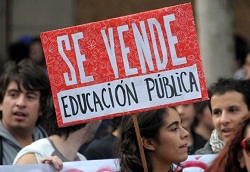Knowledge and Public Education in Crisis. “Accelerated Privatization of Global Education”
Freire or Friedman?

Thomas Friedman may praise the emancipatory potential of online university courses, but are they really capable of producing more than docile workers?
Education is a concept that we confront every day in some way, shape or form, directly or indirectly. It has long been considered to be the “silver bullet” in addressing the greatest injustices pervasive in society; poverty, crime, racism, patriarchy, and socio-economic inequality. Our interaction with education is influenced by and varies based on the tentacles of power relations; class, ethnicity, gender, geography, and life experiences. For some, this interaction manifests itself in questions of best practices and educational philosophy.
For others, it revolves more around access to knowledge and questions of representation. Consequently, our conceptual interaction with education is not free of bias or ideological calculation. For whom and for what purpose(s) does education serve? What does education actually look like? Will we recognize it when we see it? Or, might we mistake it for something else? As the influential theorist of critical pedagogy Paulo Freire explained:
Education either functions as an instrument which is used to facilitate integration of the younger generation into the logic of the present system and bring about conformity or it becomes the practice of freedom, the means by which men and women deal critically and creatively with reality and discover how to participate in the transformation of their world.
Famed New York Times columnist Thomas Friedman recently wrote about the expansion of free online courses by institutions such as Stanford and MIT, as well as companies such as Coursera and Udacity. While Friedman hails this phenomenon as a “revolution” he states that “(n)othing has more potential to lift more people out of poverty — by providing them an affordable education to get a job or improve in the job they have. Nothing has more potential to unlock a billion more brains to solve the world’s biggest problems.” He goes on to sprinkle his column with anecdotes from individuals who have benefited from open online university courses.
Friedman views this technological and educational innovation as one that will allow foreign workers to have the formal training required to compete with First-World workers. The thought process is that this will ultimately be to the benefit multinational corporations, who will have a larger pool of technically skilled workers from which to employ. These private actors, equipped with a greater number of skilled (and relatively cheap) workers, will offer more gainful employment and generate more revenue, ultimately alleviating poverty in the Third World.
Along the same lines was a recent editorial written by Pauline Rose, Director of the Global Monitoring Report on Education published by UNESCO. In her piece, Rose calls for a Bill Gates-like figure to emerge to spark global education funding among private companies and foundations. Corporate philanthropy is deemed the solution to improving global access to education. Following Friedman’s logic, Rose states:
On the face of it, there should be little need to make the business case for education. It is intrinsically tied to all positive development outcomes. Economic growth, health, nutrition and democracy are all boosted by quality schooling. If all children in low-income countries left school with basic reading skills, poverty would fall by 12 percent – and that’s good for business. The private sector benefits directly from an educated, skilled workforce.
Friedman and Rose are essentially calling for the accelerated privatization of global education. This is a trend that has already begun in the US, as we have witnessed the growth of schools run by private corporations, an unflinching emphasis on test scores, and the decimation of teachers unions coupled with the flawed notion that teachers alone are responsible for educational underachievement.
What this privatization enables, and what is furthered by both Friedman and Rose’s pieces, is the disavowal of considering the larger socioeconomic issues related to global capitalism and neoliberalism, issues that are intrinsically conjoined to education. The danger is not the technological advancement enabling greater access to education for the Third World, but rather its implications that we continually fail to critically scrutinize.
Instead of hailing the introduction of free online courses as a revolution in global education that will alleviate poverty and suffering, why do we not question the global system which allowed, if not actively encouraged, the formation of the existing desolate situation to begin with? Pieces like Friedman’s and Rose’s actively assist in paralyzing us from thinking about how we have arrived in a situation where, as Rose states, “(t)here are 61 million children out of school.”
They seem to conveniently forget the fact that IMF structural adjustment programs have severely reduced public education spending by governments, and that the privatization of education has led to an increase in societal segregation, asseen in Chile. When relying on the framework used by Friedman and Rose, we effectively hinder ourselves from asking what kind global economic system exists to allow the situation where the privatization and corporate philanthropy becomes the solutions to address already existing radical inequalities.
In the end, it all comes back to the original question of the purpose of education. For Friedman and Rose, its purpose is to produce worker who will further entrench an unjust economic order that created the problem in the first place. The overarching goal is to convince us that the remedy for our current problems is actually the very pill which caused the sickness to begin with. For Freire, education’s purpose is to enable students to flourish in a manner that critically analyzes how we arrived to this bleak situation and how we can begin to transform it.
Freire or Friedman? The choice is ours to make.

